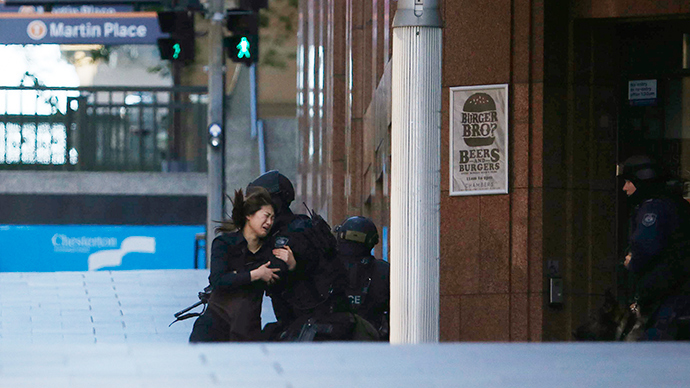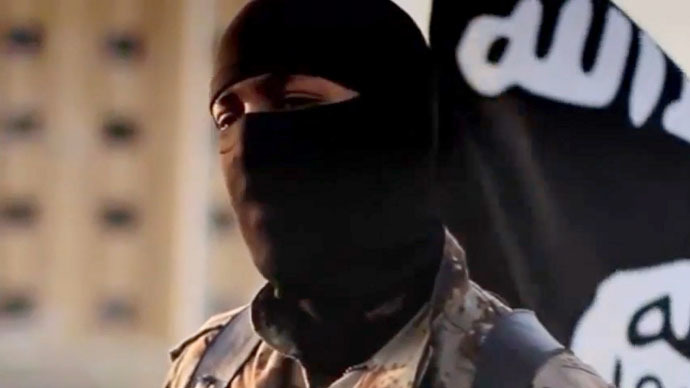Australia's interventionist foreign policy - time for a rethink

The tragic Sydney café siege of earlier this week, which resulted in the death of three people, raises quite a few serious questions.
Why on earth was Man Haron Monis, the hostage taker who faced more than 40 sexual assault and indecency charges, and who had been charged with being an accessory to the murder of his ex-wife, still at liberty? Why did the Australian authorities refuse to send Monis back to Iran, his home country, who it has been reported, repeatedly requested his extradition via Interpol to answer charges of fraud? And why wasn‘t a man who had sent hate mail to the grieving families of members of the Australian armed forces who had been killed in action and who had publicly pledged his allegiance to the Islamic State, under any form of monitoring by Australia‘s security services?
These questions are very important and need to be answered pretty quickly, but there‘s something else we ought to be discussing too. While we can all agree that Monis was an evil man who should not have been at liberty, it seems that this already volatile and disturbed character was radicalized further by Australian foreign policy, and in particular Australia’s unconditional support for US military adventures in the Middle East. Our disgust at what has happened on Monday and our unequivocal condemnation of Monis’s actions should not stop us from having an honest, grown-up debate about Australia’s interventionist foreign policy in recent years and where it has led the country.
Changing Australia’s foreign policy would be condemned by neoconservatives and war hawks as “giving in to terrorism,” but in fact taking a more isolationist position, and ending its unconditional ‘blank check’ support for US military campaigns would be the best way Australia could help counter radical Islamic terrorism.
Let’s reflect on what’s happened over the past decade and a half- and how US actions- backed by Australia- have actually bolstered the cause of radical Islam.
In 2001, in the aftermath of the 9/11 attacks on New York, Australian Prime Minister John Howard pledged George W. Bush his country’s full support for the US’s ‘War on Terror’. That meant Australian troops taking part in the invasion and occupation of Afghanistan and Australian being part of the ‘Coalition of the Willing’ in Iraq.
The US and its allies should have learnt from history, including recent history, that foreign invasions of Afghanistan routinely end in failure but of course given the arrogance of the West's neocon and 'liberal interventionist' elite they didn’t. The Taliban were not defeated and Osama bin Laden was not put out of action, or at least not until 2011, ten years after the invasion.
Instead, the costly occupation of Afghanistan only led to greater Muslim resentment against the West, and a new generation of radicals determined to fight jihad against the occupiers of Muslim lands.
The consequences of the Iraq invasion have been even worse. Here, the US and its allies forcibly toppled a secular government which was a strong regional bulwark against Al-Qaeda and Islamic fundamentalism in general. At first Australian Prime Minister John Howard struck a triumphant tone. “Not only was the military operation completed quickly and successfully but it is also worth recording that all the doomsday predictions… were not realized,” he crowed in May 2003. He also said that the Iraq invasion had brought about a “permanent change of attitudes in the Middle East.” Too right it had. The invasion of Iraq and the toppling of Saddam Hussein, the ageing, cigar-smoking Sound of Music-loving secularist whose long-serving Foreign Minister Tariq Aziz was a practicing Christian, played right into the hands of al-Qaeda and other fanatical, fundamentalist groups.

As opponents of the war had warned, following the toppling of Saddam Hussein and the Baathists, Iraq fell into chaos and became a magnet for radical jihadists. “The anti-war movement argued throughout that an attack on Iraq, by inflaming Arab and Islamic opinion, would lead only to more terrorist activity in the Middle East. All the evidence to date shows that the war has indeed had such a radicalizing effect,” I wrote in a column for The Australian newspaper entitled ‘Hatred Filled by Warmongers’ in May 2003.
At every step of the way the US and its allies directly or indirectly boosted the cause of religious extremists. For instance, while the moderate Baathist Tariq Aziz remained incarcerated, the current ‘Emir’ of ISIS, Abu Bakr al-Baghdadi was released by the Americans from an Iraqi jail.
Even after Iraq, US foreign policy carried on along the same neocon inspired path targeting secular, socialistic governments and aiding the radicals. Muammar Gaddafi’s Libya was another bulwark against the religious extremists, and it too was earmarked for ‘regime change’ in 2011. Result? Libya became the new Iraq, and a country which had the highest standard of living in Africa transformed into a failed state.
The Syrian authorities helped foil a suspected Al-Qaeda plot to bomb the US Embassy in Damascus in 2006. In any genuine war on Al-Qaeda and its affiliates Baathist Syria, a country where Christians and other religious minorities enjoy full freedom of worship, would have been an ally - but no- the US targeted the country for violent regime change. Anti-government ‘rebels’ were portrayed as cuddly, peace-loving democrats in much of the Western media with their extremist associations played down or ignored altogether. Today, we are told that Islamic State is Public Enemy Number One for the Western powers but let’s not forget that just sixteen months ago the same Western leaders warning us now about the threat from IS were baying for air strikes against the Syrian government which was fighting IS and other fanatical extremists. Like his US and UK counterparts, Kevin Rudd, the then Australian Prime Minister took a hawkish line against President Assad, calling for a “robust international response” against the government fighting IS. Tony Abbott, then in Opposition, took issue with Ruddsaying: “This idea that Australia is going to be a key player here is, I think, to rather exaggerate our own importance. Should any action be taken, it will be taken by countries with the capability to do so, and Australia is not one of those.”

Yet while Abbott’s stance in August 2013 on Syria while in opposition was sensible, it’s hard to say the same about his decisions while in government. One again, it’s been back to interventionism. Abbott signed Australia up to the military campaign against the Islamic State, and Australian planes have been bombing IS positions in Iraq.
Conservative realists from his own party warned Abbott against getting his country involved once again in a lengthy military campaign in the Middle East.
“Washington and its allies, such as Australia, need to think clearly and perhaps coldly about any further military intervention,”wrote Tom Switzer in an article entitled‘Iraq intervention; Australia should not follow the US into this mess’.
In another article for the journal Quadrant, entitled ‘The Case Against the New Iraq War’ Switzer correctly pointed out that the ‘taproot’ for the current disaster in Iraq, and the rise to dominance of the Islamic State was the war against Saddam’s regime in 2003. “To repeat: it was the US invasion that shattered the Sunni-run state, which allowed age-old ethnic and sectarian tensions to resurface. The result has been Iraq’s descent into anarchy and violence. If one remains unconvinced about the link between the invasion and the mayhem today, think about it this way: before March 2003, there was no terrorism problem in Iraq. Since ‘liberation’, however, Iraq has attracted jihadists like flies to a dying animal.”
Instead of blindly following the policies of Washington, Australia’s leaders would have been better off listening to the views of conservative realists like Switzer, and indeed anti-war leftists such as the great Australian journalist John Pilger, who has also been sharply critical of his country’s foreign policy. Australia didn’t have to get involved in US wars in the Middle East, wars which have only boosted the radical Islamic terrorist cause, and increased the dangers faced by Australian citizens.
The statements, views and opinions expressed in this column are solely those of the author and do not necessarily represent those of RT.
The statements, views and opinions expressed in this column are solely those of the author and do not necessarily represent those of RT.













